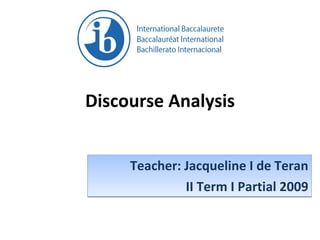
Discourse Analysis
- 1. Discourse Analysis Teacher: Jacqueline I de Teran II Term I Partial 2009
- 2. Register In linguistics , a register is a variety of a language used for a particular purpose or in a particular social setting. For example, an English speaker may adhere more closely to prescribed grammar , pronounce words ending in -ing with a velar nasal (e.g. "walking", not "walkin'") and refrain from using the word " ain't " when speaking in a formal setting, but the same person could violate all of these prescriptions in an informal setting. http://en.wikipedia.org/wiki/Language_register
- 3. Formality Scale In one prominent model, Joos (1961) describes five styles in spoken English: Frozen: Printed unchanging language such as Biblical quotations; often contains archaisms . Formal: One-way participation, no interruption. Technical vocabulary; "Fussy semantics" or exact definitions are important. Includes introductions between strangers. Consultative: Two-way participation. Background information is provided — prior knowledge is not assumed. "Back-channel behaviour" such as "uh huh", "I see", etc. is common. Interruptions are allowed. Casual: In-group friends and acquaintances. No background information provided. Ellipsis and slang common. Interruptions common. Intimate: Non-public. Intonation more important than wording or grammar. Private vocabulary. Formality scaleThis diagram is from Quirk et al. (1985), who use the term attitude rather than style or register Very formal, Frozen, Rigid ← FORMAL Neutral INFORMAL -> Very informal, Casual, Familiar
- 4. Variety A register (sometimes called a style ) is a variety of language used in a particular social setting. [9] Settings may be defined in terms of greater or lesser formality, [10] or in terms of socially recognized events, such as baby talk , which is used in many western cultures when talking to small children, or a joking register used in teasing or playing the dozens [9] There are also registers associated with particular professions or interest groups; jargon refers specifically the vocabulary associated with such registers. http://en.wikipedia.org/wiki/Variety_(linguistics)#Registers_and_Styles
- 5. Language A language is a system for encoding information . In its most common use, the term refers to so-called " natural languages " — the forms of communication considered peculiar to humankind . In linguistics the term is extended to refer to the human cognitive facility of creating and using language. Essential to both meanings is the systematic creation and usage of systems of symbols —each referring to linguistic concepts with semantic or logical or otherwise expressive meanings. http://en.wikipedia.org/wiki/Language
- 6. Verbatim transcript http://www.essentialsecretary.co.uk/verbatim_transcription.htm It is a full transcript of everything that is said in the recording which includes the common 'ems' and 'ers', 'you knows', 'I mean', and 'sort of' etc. These types of transcripts are often required for interviews by universities for qualitative analysis and for interviews given in evidence for legal purposes.
- 7. Rhetorical Plato: Rhetoric is "the art of winning the soul by discourse." Aristotle: Rhetoric is "the faculty of discovering in any particular case all of the available means of persuasion. Cicero: "Rhetoric is one great art comprised of five lesser arts: inventio, dispositio, elocutio, memoria, and pronunciatio." Rhetoric is "speech designed to persuade." Quintillian: "Rhetoric is the art of speaking well." Francis Bacon: Rhetoric is the application of reason to imagination "for the better moving of the will." George Campbell: [Rhetoric] is that art or talent by which discourse is adapted to its end. The four ends of discourse are to enlighten the understanding, please the imagination, move the passion, and influence the will.
- 8. Structural elements http://www.speakspeak.com/html/d10_english_grammar.htm - lists of all the tenses in English - structures and examples of the tenses - grammar rules, including example sentences - examples of common errors and how you can avoid making them.
